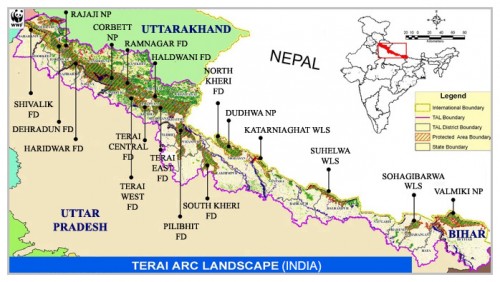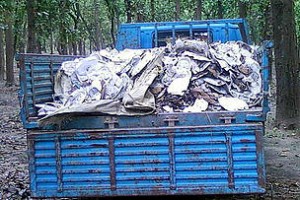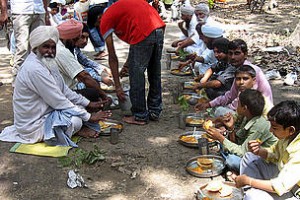Reducing plastic pollution in Pilibhit Forest Division
WWF-India works with Uttar Pradesh state Forest Department to provide alternatives to plastic. Forests and religious beliefs in India The people of India associate forests with more than the usual
Forests and religious beliefs in India
The people of India associate forests with more than the usual bounties – pure air, clean water and lush greenery, that nature provides man with. Across this huge country, there is a deep religious sentiment and spiritual feeling attached to the wilderness. Saints of various religions here – the rishis, munis, fakirs and monks find solace in nature, away from the sea of humans. Consequently, many forests here are considered sacred by the local communities in which their deities reside. People have many religious beliefs attached to such forests.

The Pilibhit Forest Division, a proposed Tiger Reserve in the Indian state of Uttar Pradesh, also has one such religious place – the Sidhha Baba Temple. It is situated on the banks of River Mala, within the Mala Forest Range, Pilibhit. Every year, during the months of May- June, local people organize a fair inside this forest that runs for about thirty days and

attracts thousands of people from both near and distant places. The rich among the devotees organise religious feasts to reinforce their faith in this place. In the past, leaves of sal tree were used as plates to serve food during such feasts and to distribute prasad (part of an offering to a Hindu God/ Goddess). That practice had limited impact on nature as the sal leaves would degrade in a few weeks, leaving minimal trace of such feasts. But the changing times have brought with them an unwelcome reality. Over the past few years, the sal leaf plates have been replaced by plastic or other non-degradable material (e.g. polythene and thermocol). These non-biodegradable materials are disposed in the forest, posing a serious threat to the habitats and their dependent wildlife. At the end of the fair last year, when WWF-India’s Pilibhit office organised a campaign with the help of students, boy Scouts and girl Guides, to clean the forest, seven trucks of non-biodegradable material was collected and removed from this forest.
Preventing plastic pollution
This year, WWF-India moved a step ahead and initiated the awareness campaign a week before the onset of the fair. According to Mudit Gupta, Assistant Coordinator, TAL-UP, “We put banners at important locations and distributed pamphlets (flyers) in nearby villages to make people aware about the hazards of non-biodegradable material and its potential impacts on forest and wildlife.”

The fair was organised from 17 May to 29 June and WWF-India ran its campaign with the support of Forest Department and Bharat Scout & Guides, Pilibhit District. The Forest Department issued orders prohibiting the use of non-biodegradable material at the fair and all shopkeepers were issued strict instructions about this ban. A barrier was erected at the fair’s main entrance and Forest staff along with Scouts and Guides were deployed to check the fair participants and ensure no visitors were allowed to take non-biodegradable material in the forest area. Gradually people got used to this new reality and started using nature friendly material. Mudit adds, “It was good to observe a clean forest after the fair and that no non-biodegradable material was lying strewn on the forest floor. This initiative of WWF-India was very well appreciated by local media and administration.” Mr. Naresh Kumar- Project Officer says, “People have affection and regard for this forest but sometimes cause harm due to lack of knowledge and an unsustainable life style. At the Sidhha Baba Fair people were unwittingly disposing plastic waste in the forest. This year, we made them aware that minor changes in their habits could help this forest and wildlife forever. The fair’s participants cooperated with us and avoided use of harmful materials. The results were amazing. Our aim was to change the attitude of people towards the forest and we were quite successful.”

Similar Story

‘All For My Dad’s Memory’: This Hero Has Grown 12 Food Forests In The Heart of Mumbai
A tree lover since the age of 9, George Remedios quit his advertising job and founded ‘The Turning Tide’ to increase the forest cover in Mumbai. So far, he has planted 12 food forests with edible fruits and encourages people to grow their own food, even in limited spaces.
Read more >
If you found our stories insightful, informative, or even just enjoyable, we invite you to consider making a voluntary payment to support the work we do at The Better India. Your contribution helps us continue producing quality content that educates, inspires, and drives positive change.
Choose one of the payment options below for your contribution-
By paying for the stories you value, you directly contribute to sustaining our efforts focused on making a difference in the world. Together, let's ensure that impactful stories continue to be told and shared, enriching lives and communities alike.
Thank you for your support. Here are some frequently asked questions you might find helpful to know why you are contributing?


This story made me
-
97
-
121
-
89
-
167












